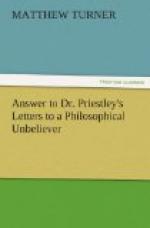It is the general fashion to believe in a God, the maker of all things, or at least to pretend to such a belief, to define the nature of this existing Deity by the attributes which are given to him, to place the foundation of morality on this belief, and in idea at least, to connect the welfare of civil society with the acknowledgement of such a Being. Few however are those, who being questioned can give any tolerable grounds for their assertions upon this subject, and hardly any two among the learned agree in their manner of proving what each will separately hold to be indisputably clear. The attributes of a Deity are more generally agreed upon, though less the subject of proof, than his existence. As to morality, those very people who are moral will not deny, they would be so though there were not a God, and there never yet has been a civil lawgiver, who left crimes to be punished by the author of the universe; not even the profanation of oaths upon the sacredness of which so much is built in society, and which yet is said to be a more immediate offence against the Deity than any other that can be named.
The method which Dr. Priestley has taken to prove the existence of a God, is by arguing from effect to cause. He explodes that other pretended proof a priori which has so much raised the fame of Dr. Clarke among other theologians. As to the attributes of the Deity, Dr. Priestley is not quite so confident in his proofs there; and the most amiable one, the most by mortals to be wished for, the benevolence of God he almost gives up, or owns at least there is not so much proof of it as of his other attributes. His observations are divided into several Letters, this is one answer given to the whole; for it would be to no purpose to reply to topics upon which the writers are agreed. What therefore is not contradicted here, Dr. Priestley may in general take to be allowed; but to obviate doubts and to allow his argument every force, it may be fairer perhaps to recite at full length what in this answer is allowed to be true, what is denied as false, what meant to be exposed as absurd, and what rejected as assertions without proof, inadmissible or inconclusive. The conclusion will contain some observations upon the whole.
TRUISMS.
1. “Effects have their adequate causes.”
2. “Nothing begins to exist without a cause foreign to itself.”
3. “No being could
make himself, for that would imply that he
existed and did not exist
at the same time.”
4. If one horse, or one tree, had a cause, all had.”
5. Something must have existed from all eternity.
6. “Atoms cannot
be arranged, in a manner expressive of the most
exquisite design, without
competent intelligence having existed
somewhere.”
7. “The idea of
a supreme author is more pleasing to a virtuous
mind, than that of a blind
fate and fatherless deserted world.”




